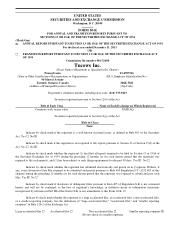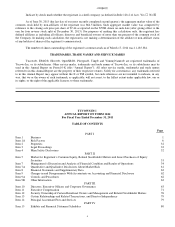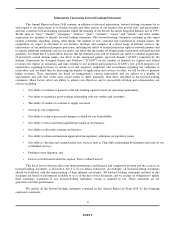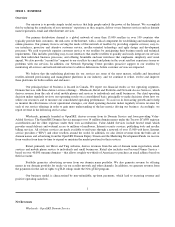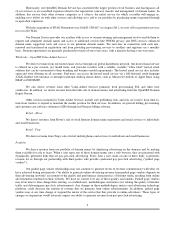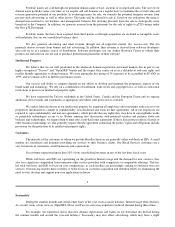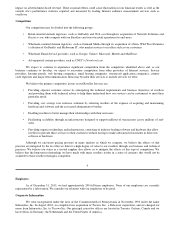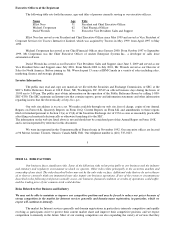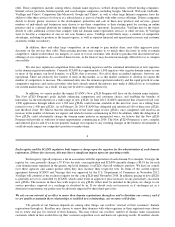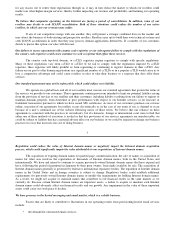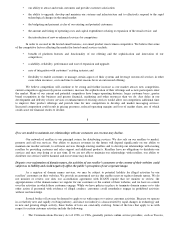Tucows 2013 Annual Report Download - page 10
Download and view the complete annual report
Please find page 10 of the 2013 Tucows annual report below. You can navigate through the pages in the report by either clicking on the pages listed below, or by using the keyword search tool below to find specific information within the annual report.
for any reason, not to renew their registrations through us, it may in turn reduce the market to which our resellers could
market our other higher-margin services, thereby further impacting our revenue and profitability and harming our operating
results.
We believe that companies operating on the Internet are facing a period of consolidation. In addition, some of our
resellers may decide to seek ICANN accreditation. Both of these situations could reduce the number of our active
resellers, in which case our revenues may suffer.
If any of our competitors merge with one another, they will present a stronger combined force in the market and
may attract the business of both existing and prospective resellers. Resellers may opt to build their own technical systems and
seek ICANN accreditation in order that they may process domain applications themselves. If a number of our customers
decide to pursue this option, our sales will decrease.
Our failure to secure agreements with country code registries or our subsequent failure to comply with the regulations of
the country code registries could cause customers to seek a registrar that offers these services.
The country code top-level domain, or ccTLD, registries require registrars to comply with specific regulations.
Many of these regulations vary from ccTLD to ccTLD. If we fail to comply with the regulations imposed by ccTLD
registries, these registries will likely prohibit us from registering or continuing to register domains in their ccTLD. Any
failure on our part to offer domain registrations in a significant number of ccTLDs or in a popular ccTLD would cause us to
lose a competitive advantage and could cause resellers to elect to take their business to a registrar that does offer these
services.
Our standard agreements may not be enforceable, which could subject us to liability.
We operate on a global basis and all of our resellers must execute our standard agreements that govern the terms of
the services we provide to our customers. These agreements contain provisions intended to limit our potential liability arising
from the provision of services to our resellers and their customers, including liability resulting from our failure to register or
maintain domains properly, from downtime or poor performance with respect to our Internet services, or for insecure or
fraudulent transactions pursuant to which we have issued SSL certificates. As most of our customers purchase our services
online, execution of our agreements by resellers occurs electronically or, in the case of our terms of use, is deemed to occur
because of a user’s continued use of the website following notice of those terms. We believe that our reliance on these
agreements is consistent with the practices in our industry, but if a domestic, foreign or international court were to find that
either one of these methods of execution is invalid or that key provisions of our services agreements are unenforceable, we
could be subject to liability that has a material adverse effect on our business or we could be required to change our business
practices in a way that increases our cost of doing business.
7
Regulation could reduce the value of Internet domain names or negatively impact the Internet domain acquisition
process, which could significantly impair the value attributable to our acquisitions of Internet domain names.
The acquisition of expiring domain names for parked page commercialization, the sale of names or acquisition of
names for other uses involves the registration of thousands of Internet domain names, both in the United States and
internationally. We have and intend to continue to acquire previously-owned Internet domain names that have expired and
have, following the period of permitted reclamation by their prior owners, been made available for sale. The acquisition of
Internet domain names generally is governed by federal or international regulatory bodies. The regulation of Internet domain
names in the United States and in foreign countries is subject to change. Regulatory bodies could establish additional
requirements for previously-owned Internet domain names or modify the requirements for holding Internet domain names.
As a result, we might not acquire or maintain names that contribute to our financial results in the same manner as we
currently do. Because certain Internet domain names are important assets, a failure to acquire or maintain such Internet
domain names could adversely affect our financial results and our growth. Any impairment in the value of these important
assets could cause our stock price to decline.
We have presence in the hosted messaging and email market, which is a volatile business.
Factors that are likely to contribute to fluctuations in our operating results from provisioning hosted email services
include:
•
the demand for outsourced email services;

